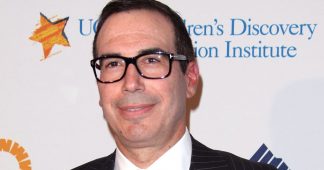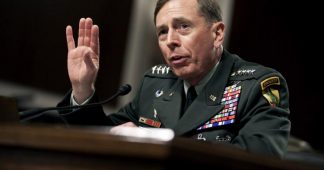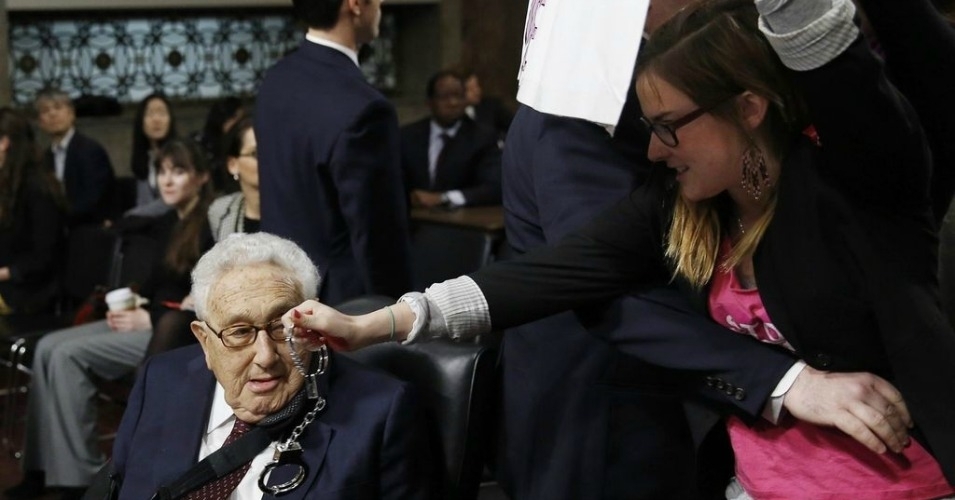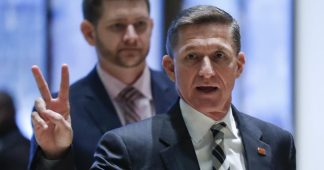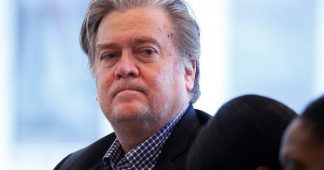By
09.01.2017
The term Back Door Man has several connotations. In the original blues song written by Willie Dixon, it refers to a man having an affair with a married woman, using the back door to flee before the husband comes home. During the Gerald Ford Presidency, Back Door Man was applied to Dick Cheney as Ford’s White House Chief of Staff and his “skills” at getting what he wanted through opaque means. More and more as Cabinet choices are named, it looks like the entire Trump Presidency project is emerging as Henry A. Kissinger’s “Back Door Man,” in the Cheney meaning of the term.
Long forgotten is Trump’s campaign rhetoric about draining the swamp. In October during his campaign candidate Trump issued a press release stating, “Decades of special interest dealing must come to an end. We have to break the cycle of corruption…It is time to drain the swamp in Washington, D.C…That is why I am proposing a package of ethics reforms to make our government honest once again.”
So far, the President-elect has already named more billionaires to cabinet and other top posts than any other president in US history–Betsy DeVos of the AmWay fortune as Education Secretary, Wilbur Ross as Commerce Secretary, Linda McMahon as Small Business Administrator, and Vincent Viola, as Army Secretary. That’s not including Trump himself as a putative billionaire.
Then in terms of the vested special interests of Wall Street, Goldman Sachs has a huge power in the new Administration. Goldman Sachs partner Steven Mnuchin is Trump’s nominee for US Treasury Secretary. Goldman Sachs President Gary Cohn will be his top White House Economic Adviser. Anthony Scaramucci, Presidential Transition Team Executive Committee member, is a former Goldman Sachs banker as well as Steve Bannon, Trump’s chief strategist and Senior Counselor.
We add to that assemblage no fewer than four US military generals representing the most corrupt military industrial complex in world history: as Secretary of Defense retired General James “Mad Dog” Mattis, Board member since retiring of major defense contractor General Dynamics; retired Lt. General Mike Flynn, with his own consulting firm, as his National Security Adviser and retired General John F. Kelly as Secretary of Homeland Security.
Add to this collection the naming of Rex Tillerson the CEO of ExxonMobil, the largest oil multinational of the United States, as Secretary of State; the ex-Governor of Texas, America’s largest oil producing state, Rick Perry, as Secretary of Energy, along with pro-shale energy Oklahoma Attorney General, Scott Pruitt to be head of the Environmental Protection Agency, and certain dramatic economic policy flips begin to emerge compared with the previous hapless Presidency.
Back Door for Kissinger Geopolitics
What emerges is not pretty and, sadly, more than confirms my earlier piece on the Trump Deception.
However, all this misses in my view one essential component, namely the shadowy role of former Secretary of State Henry A. Kissinger, who is emerging as the unofficial and key foreign policy adviser of the Trump Administration. If we follow Kissinger’s tracks in recent months we find a highly interesting series of meetings.
On December 26, 2016 the German daily Bild Zeitung published what it said was a copy of an analysis by members of the Trump Transition Team which revealed that as President Trump will seek “constructive cooperation” with the Kremlin, a dramatic contrast to Obama confrontation and sanctions policies. The newspaper went on to discuss the role of 93-year-old former Secretary of State, Henry A. Kissinger as Trump’s leading, if unofficial, foreign policy adviser. The report stated that Kissinger is drafting a plan to bring Putin’s Russia and Trump’s Washington to more “harmonious” relations that includes US official recognition of Crimea as part of Russia and lifting of US economic sanctions that Obama imposed in retribution for the Crimea annexation in 2014, among other steps.
The kicker in this otherwise sensible-sounding US policy change is Kissinger’s sly geopolitical aim in “gettin’ Putin back in the (NATO) tent,” as late Texan President Lyndon Baines Johnson might have elegantly put it.
What is the aim of Kissinger? Not any “multi-polar world” that respects national sovereignty as he claims, of that you can be certain. Kissinger’s aim is to subtly erode the growing bilateral axis between China and Russia that threatens US global hegemony.
The trend of the last several years since Obama’s ill-fated coup d’etat in Ukraine in early 2014, threatened to jeopardize Kissinger’s lifetime project, otherwise called David Rockefeller’s “march towards a World Government,” a World Government in which “supranational sovereignty of an intellectual elite and world bankers is surely preferable to the national auto-determination practiced in past centuries,” to use Rockefeller’s words to one of his select groups during the collapse of the Soviet Union in 1991. The Bild Zeitung Trump-Kissinger memo states that the idea of warming up to Russia is aimed at offsetting China’s military buildup. In other words, a different game from Obama’s, but a game of power nonetheless.
Real Balance of Power
Kissinger is one of the few surviving practitioners of historical British Balance of Power geopolitics. True British Balance of Power, as practiced in British military and diplomatic history since the Treaty of Windsor of 1386, between England and Portugal, always involved Britain making an alliance with the weaker of two rivals to defeat the stronger and in the process, to afterwards loot the exhausted weaker power as well. It was extraordinarily successful in building the British Empire down to World War II.
British Balance of Power is always about what power, in this case a Kissinger-steered United States, does the “balancing.” Following the defeat of Napoleon’s France at the Congress of Vienna peace talks in 1814, British Foreign Secretary, Viscount Castlereagh, architected a treaty that insured no Continental European power could dominate over the others, a strategy that lasted until 1914 and the First World War. What many political historians ignore is that that Continental Balance of Power was essential for creation of the British Empire that dominated the world as the leading naval power for a century.
In his 1950’s Harvard University PhD dissertation, Kissinger wrote what became a book titled, “A World Restored: Metternich, Castlereagh and the Problems of Peace, 1812-1822.” That study of British Balance of Power is at the heart of Kissinger’s Machiavellian machinations ever since he took his first job with the Rockefeller family in the 1960’s. In A World Restored Kissinger states, “Diplomacy cannot be divorced from the realities of force and power. But diplomacy should be divorced…from a moralistic and meddlesome concern with the internal policies of other nations.” Further, he states, “The ultimate test of a statesman, then, is his ability to recognize the real relationship of forces and to make this knowledge serve his ends.”
Since his relationship began in the 1950’s with Nelson Rockefeller and the brothers Rockefeller–Laurance, David, Winthrop– Henry Kissinger has been the core strategist of the Rockefeller family’s globalization or World Government above nation states as David called it in 1991. That included Kissinger’s role with the Bilderberg Meetings, with David’s Trilateral Commission and right down to the present. It was Secretary of State Kissinger who asked his good friend David Rockefeller to facilitate Nixon’s “China opening” to the West in 1971. Then the geopolitical aim of Kissinger’s rebalance was to seduce China, then the weaker of Washington’s two great adversaries, into the Western alliance against the Soviet Union, then the stronger adversary, at least in military and geopolitical terms.
Today, as the year 2017 begins, the roles have turned and clearly China has emerged after more than three decades of unbridled industrial and economic expansion, as the stronger challenger of David Rockefeller’s so-called World Government. Russia, following the economic savagery and deindustrialization of the post-1991 Yeltsin years, is in Kissinger’s view, clearly the weaker of his two adversaries. Both China and Russia under Xi Jinping and Putin, are, together with Iran, the most formidable defenders of national sovereignty–the main obstacles standing in the way of David Rockefeller’s (I use him as the template) World (fascist) Government.
Kissinger’s strange diplomacy
If we perceive Kissinger’s recent actions from this perspective–how to break the emerging Eurasian threat to a Western-dominated One World Order–it makes much sense. He has been shockingly fulsome in his recent praise of the political neophyte casino mogul Trump. In an early December CBS TV interview, Kissinger said that Trump, “has the possibility of going down in history as a very considerable President.” He added that because of perceptions that Obama weakened America’s influence abroad, “one could imagine that something remarkable and new emerges” out of a Trump administration. “I’m saying it’s an extraordinary opportunity.”
The more we look under the rocks and at the key foreign policy choices of neophyte Trump, we find the pawprints of Henry A. Kissinger. The choice of General James “Mad Dog” Mattis to be Secretary of Defense intersects Kissinger. Mattis and Kissinger both served until early 2016 on the Board of Directors of a bizarre and very controversial California medical technology private partnership, Theranos, together with (until recently) former US Secretary of State George Shultz, former Secretary of Defense Bill Perry, retired U.S. Navy Adm. Gary Roughead, former Wells Fargo Bank chairman Dick Kovacevich.
Mattis, whom Trump compares to General Patton, in August, 2016 wrote a report attacking both Obama, Bush and Bill Clinton administrations’ foreign military policy, blasting the last three administrations for a perceived lack of national security vision, by ignoring threats posed by Russia, China and terrorist groups worldwide.
As well, the pawprints of the sly Kissinger appear with the surprise naming of ExxonMobil head Rex Tillerson to be Secretary of State. ExxonMobil is of course the original core of the Rockefeller family wealth. Kissinger issued a decisive and strong recommendation of Tillerson, stating that because Tillerson has strong personal relations with Russian President Putin and Russian state oil company, Rosneft, it is no reason to disqualify Tillerson: “I pay no attention to the argument that he is too friendly to Russia. As head of Exxon it’s his job to get along with Russia. He would be useless as the head of Exxon if he did not have a working relationship with Russia.” As with Kissinger and Mattis, Kissinger also serves on a Board of Trustees with Tillerson. Both Tillerson and Kissinger are Trustees of the very influential Washington Center for Strategic and International Studies (CSIS), along with such as Zbigniew Brzezinski and former Defense Secretary Leon Panetta.
In true Kissinger secret diplomacy style so skillfully applied during his role in triggering the October, 1973 Yom Kippur war, Kissinger has apparently won the respect of Vladimir Putin as a “world class politician.” In February, 2016 Kissinger went to Moscow to privately meet with Putin. Kremlin spokesman Dmitry Peskov called that meeting a continuation of “a friendly dialogue between President Putin and Henry Kissinger, who are bound by a long-standing relationship.”
And on December 2, Kissinger was personally invited by China President Xi Jinping to meet in Beijing to discuss the prospects for China of the Trump presidency. Kissinger is regarded since 1971 as uniquely trusted by the Chinese to serve as a mediator of US policy intentions.
With Kissinger now in a unique relationship with President-elect Trump as shadow foreign policy adviser, with Kissinger allies Tillerson as Secretary of State and Mattis as Secretary of Defense, it is beginning to appear that the heavy hand of Kissinger and his version of British Balance of Power political manipulations is about to target China, as well as Iran, and to try to use Putin and Russia to destroy the genuine possibility of a counterweight to Western One World delusions, by fostering mistrust and bad blood between China and Russia and Iran.
There is simply too much coincidence in the recent emergence of the Kissinger–world statesman of peace–to not think that in truth, from the outset, Donald Trump was designed to be Henry A. Kissinger’s Back Door Man, in order to re-tilt global geopolitics back to a US leading role as Domina über Alles.
* F. William Engdahl is strategic risk consultant and lecturer, he holds a degree in politics from Princeton University and is a best-selling author on oil and geopolitics, exclusively for the online magazine “New Eastern Outlook.”

